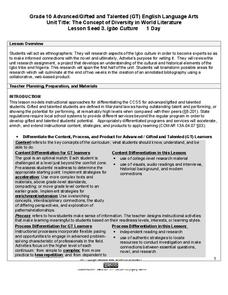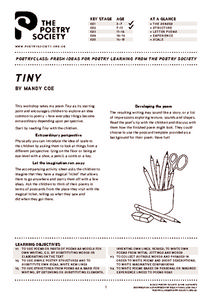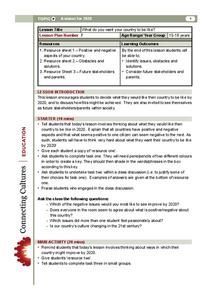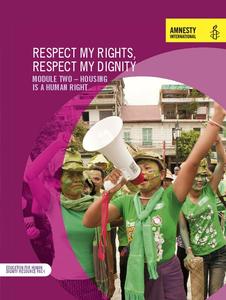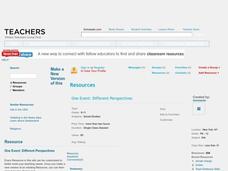Maryland Department of Education
The Concept of Diversity in World Literature Lesson 3: Igbo Culture
What cultural concepts must readers understand in order to connect to Things Fall Apart? As part of their study of Chinua Achebe’s novel, class members research Nigeria and the Igbo culture to create a collaborative, web-based, annotated...
Ohio Center For Law-Related Education
Four Activities: Thurgood Marshall and the Nomination and Confirmation of Federal Judges
The process of nominating and confirming federal judges can sound like a lot of bureaucratic hoops, but a resource breaks down the steps of the Supreme Court nominations in a simpler manner. Learners participate in four activities that...
Newseum
Weighing the Arguments
To understand how personal perspectives can affect policy and politics, scholars examine the woman suffrage media map and historical artifacts to analyze arguments for and against women's suffrage. Class members then take on the role of...
Curated OER
The Adventures of Tom Sawyer: "Chalk Talk Strategy”
Hold a silent discussion about concepts related to The Adventures of Tom Sawyer. After reading chapter seven, learners participate in a whole-class written discussion based on guiding questions written on the board by the teacher.
Curated OER
Finding Meaning in the Badge
Children who are three to five years old study two rank badges from the Qing dynasty to develop an understanding of social rank, language skills, and symbolism. The instructional activity is discussion-based and requires learners to...
Brigham Young University
Rosencrantz and Guildenstern Are Dead: Fishbowl Discussion
After reading through Act II of Rosencrantz and Guildenstern Are Dead, take some time to discuss the references to death in the play. For this fishbowl discussion, learners prepare questions, practice answering individually and with...
Administrative Office of the US Courts
Texas v. Johnson
Which right does the Constitution weigh more heavily: the sanctity of the American flag as a symbol of national unity, or the right to burn the flag in protest? The 1989 Supreme Court case of Texas v. Johnson explores a state's right to...
Stanford University
What Is History?
Five important tenets of any social studies class are available for young historians with a poster that defines history as an account of the past. It encourages learners to question reliability of an author's perspective, as well as to...
Museum of Tolerance
Cultural Research Activity
Class members explore cultural diversity through a variety of texts that showcase the importance of traditions. Then, they interview their family members to research their own cultural background and write their findings on quilt pieces....
K20 LEARN
Grandmother, What A Big Culture You Have!: Cultural Characteristics
A word splash activity introduces scholars to the lesson's theme—cultural characteristics. First, in examining Little Red Riding Hood by The Brothers Grimm, learners highlight the cultural characteristics and then spot the differences in...
Poetry Society
Tiny by Mandy Coe
Introduce magic and imagination into your classroom with a poetry activity. Learners read the poem "Tiny" by Mandy Coe and use their magic tickets to visit any place they can think of! The final result is a poem describing where they...
University of the Desert
What Do You Want Your Country to be Like?
How would you like your country to be by 2020? What issues do you feel are most important, and how do those compare with your peers? Learners tackle questions regarding the evolving national and global culture of the twenty-first century...
Nosapo
Getting to Know Each Other
How do you do? Guide learners through the basics of conversational English with an extensive set of discussion questions. Class members ask partners more about themselves, including their favorite hobbies, music, and time of day, as well...
Amnesty International
Respect My Rights, Respect My Dignity: Module One – Poverty and Human Rights
Creating an environment where learners feel both educated and empowered challenges any teacher when discussing a sometimes bleak topic. A respectful resource provides them with the details and permits them to make a plan of action....
Amnesty International
Respect My Rights, Respect My Dignity: Module Two – Housing is A Human Right
Take learners on a journey throughout the world to discover how other people live. Scholars experience a taste of what life feels like for those in poverty and without housing. Activities include discussions, building a cardboard house,...
Curated OER
Building Bridges for Young Learners--Culture
Students explore the concept of "culture." In this cross curriculum literacy and world history lesson, students listen to a letter written by a child from Namibia, then compare and contrast life in Africa with their own life. Students...
Curated OER
Kwanzaa: Invitations and Menus
It's time to celebrate Kwanzaa in the classroom! After studying the traditions of the holiday, learners design a menu decorated in the colors and symbols associated with Kwanzaa.
Curated OER
Perceptions of German Unification Over Time
Through a series of readings and handouts, learners will study the shifts in perception that followed the fall of the Berlin Wall. The history instructional activity focuses on periods of change in post WWII German history that led to a...
Curated OER
We're All Different!
Use this presentation to discuss diversity and self esteem issues. Learners talk about what makes them special, why someone might bully others, and the different types of talents people possess. This is a simple, but effective way to...
Curated OER
That Is Not My Opinion!
Being an informed citizen requires distinguishing fact from opinion and understanding persuasion methods. Secondary learners evaluate newspaper editorials. They read opinion pieces, identify the writer's purpose and position on an issue,...
Curated OER
Events Reactions Feeling _ Social Studies Lesson Plan
In this activity, Events Reactions Feelings, students analyze different events and how they feel. Students compare their feelings or reactions to a particular event with those of their classmates. Students consider why people react, feel...
Curated OER
One Event: Different Perspectives
Watch selected scenes from the mini-series, The Path to 9/11, and then have your class download and explore the 9/11 Commission Report. How are these two sources similar and different? Have your learners summarize each source and compare...
Teach Engineering
Energy Perspectives
The data says ... the resource is great to use. Using Microsoft Excel, pupils analyze data from the US Department of Energy in the fifth lesson of a 25-part Energy Systems and Solutions unit. Each group looks at a different data set and...
C3 Teachers
Reparations: Why Are Reparations Controversial?
To understand why the topic of reparations is controversial, young scholars gather background information by reading articles, watching videos, and examining cases where reparations were made. Learners consider the lasting repercussions...
Other popular searches
- Lessons for Diverse Learners
- Diverse Learners Science
- Health for Diverse Learners
- Students as Diverse Learners
- Diverse Learners Lesson
- Diverse Learners Pe
- Pe for Diverse Learners
- Diverse Learners Health


